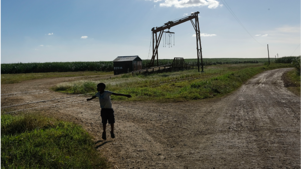The disturbing links between climate change and modern-day slavery
 © Provided by The Hill
© Provided by The Hill
On Sept. 12, a disturbing new report by the International Labour Organization (ILO), Walk Free and International Organization for Migration (IOM) revealed that the number of people in modern slavery has risen by approximately 10 million since 2016. Fifty million women, children and men are exploited through forms of slavery like forced labor and sex trafficking on any given day.
The report pointed to climate change as a significant contributing factor to the world's growing slavery epidemic.
In 1990, the Intergovernmental Panel on Climate Change predicted that the greatest impact of climate change could be on human migration, with millions displaced by erosion, flooding and food system disruptions. Now, forecasts from the World Bank warn of more than 200 million environmental migrants by 2050.
International Justice Mission (IJM), a global organization that protects people in poverty from violence, observed this connection in South Asia where we combat forced labor slavery. The IJM casework data indicated that 78 percent of rescued forced laborers had come from regions where impacts from climate change had placed their fundamental livelihoods at risk.
Additionally, IJM finds that in places where people profit from enslaving and exploiting human beings with next-to-no risk of legal sanction, the same offenders often also profit from exploiting and destroying the natural environment without risk of punitive action. Slavery and environmental destruction flourish where criminal impunity prevails and legal protection for both people and the environment is lacking.
IJM's 25 years of experience combatting violent crimes and a growing body of outside research tell a brutal story about the connection between the wanton destruction of the environment and the exploitation of people.
The illegal logging industry in Brazil is a powerful example of the way ineffective regulations and an absence of law enforcement enable the cycle of human exploitation and environmental degradation. On Sept. 4, a front-page report in the Washington Post highlighted failures of law enforcement and government intervention to address deforestation in the Amazon. On Sept. 28, a report released by the Department of Labor found Brazilian timber among the list of goods produced with slave labor. And the Department of State's 2022 Trafficking in Persons Report, released in July, noted that while Brazilian authorities made efforts to reduce the demand for forced labor, “the inadequate criminalization of these crimes hindered efforts to combat labor trafficking.”
IJM has seen similar law enforcement failures in the fishing industry in Southeast Asia, where forced labor and illegal overfishing are pervasive. In the palm oil and cocoa industries of West Africa, the scourge of forced labor and illegal deforestation also thrive in the absence of meaningful criminal sanctions. Modern slavery and environmental destruction remain largely risk-free endeavors for offenders, who stand to make a lot of money from exploitative practices.
At the same time — we now know what stops this high-profit, low-risk exploitation. In multiple projects around the world, IJM has worked with local authorities to strengthen justice systems so they better protect their most vulnerable citizens — and the data is clear. Potential criminals are decisively deterred if there is a meaningful threat of going to jail for operating these exploitative enterprises. This deterrence is not only a sign of an effective justice system, but it is also the core of IJM's model. We have seen it prove effective in reducing illegal exploitation by up to 86 percent in multiple jurisdictions around the world.
It always made sense that slavery and environmental destruction would thrive if there were massive profits to be made with virtually no risk of punishment. And now for slavery, we have proof of the opposite — that slavery enterprises collapse when there are effective and sustained legal actions taken against the perpetrators. Likewise, we can expect that illicit enterprises of environmental destruction will be dramatically reduced when justice systems are finally strengthened to impose swift and reliable criminal penalties.
In either case, for the pragmatic and profit-focused criminals, the decisive factor is not the mere existence of laws and regulations — it's whether the justice system has the strength and will to enforce them. The exploiters of humans and the environment always have their eye on the risks of legal accountability. Now is the time for those who want to end these crimes to develop the same disciplined focus.
Gary Haugen is the founder and CEO of International Justice Mission, a global organization that partners with local authorities in 29 program offices in 17 countries to combat slavery, violence against women and children, and other forms of abuse against people who are poor.
This “Eyes on Trafficking” story is reprinted from its original online location.
 ABOUT PBJ LEARNING
ABOUT PBJ LEARNING
PBJ Learning is a leading provider of online human trafficking training, focusing on awareness and prevention education. Their interactive Human Trafficking Essentials online course is used worldwide to educate professionals and individuals how to recognize human trafficking and how to respond to potential victims. Learn on any web browser (even your mobile phone) at any time.
More stories like this can be found in your PBJ Learning Knowledge Vault.
EYES ON TRAFFICKING
This “Eyes on Trafficking” story is reprinted from its original online location.
ABOUT PBJ LEARNING
PBJ Learning is a leading provider of online human trafficking training, focusing on awareness and prevention education. Their interactive Human Trafficking Essentials online course is used worldwide to educate professionals and individuals how to recognize human trafficking and how to respond to potential victims. Learn on any web browser (even your mobile phone) at any time.
More stories like this can be found in your PBJ Learning Knowledge Vault.
